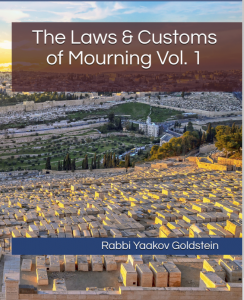
This article is an excerpt from our Sefer
May the descendants of the deceased attend the Levayah, burial?[1]
From the letter of the law it is permitted, and a Mitzvah, for the children to attend the funeral and escort the body of their parent[2], and so is the custom of several communities.[3] Nevertheless, many communities are accustomed for the descendents of the deceased not to attend the Levaya[4], and they rather proceed straight to the burial.[5] This is also the Chabad custom.[6] This applies to both male and female descendants, and applies to both children and grandchildren [that they are not to attend the Levaya].[7] This applies whether the deceased is a male [father/grandfather] or a female [mother/grandmother].[8] [However the descendents may attend the eulogies, and may be present by the Levaya until the casket begins to move. Directly prior to the moving of the casket the descendents are to exit the funeral and proceed to the cemetery in a different path than the path that will be followed by the funeral proceeding.[9]]
At the Levaya/burial, may the descendents carry or touch the coffin? The children and relatives are to carry the deceased on their shoulders up until the grave.[10] However the custom today is for the children not to carry the parent, and they don’t deal with him at all.[11] Nevertheless those that continue to do so have upon whom to rely.[12]
|
May the son in laws and daughter in-laws of the deceased attend the funeral as usual?[13] Yes. The son in laws and daughter in-laws of the deceased may attend the funeral as usual.
|
[1] See Nitei Gavriel chapter 69 for a full analysis on this subject
[2] See Michaber 340/16; Rama 358/3; Mavor Yaabok Imrei Noam 28; Igros Kodesh 20/79; Shulchan Menachem 5/152
[3] See Igros Moshe 5/24; Nitei Gavriel 69/1 and 3
[4] Gesher Hachaim 1/12 [custom of Jerusalem]; Mishmeres Shalom 30/17; Shlah Pesachim 103; mentioned in Igros Moshe 5/24; This was accustomed in many communities, to the point that a Cherem would be announced prior to the funeral against any descendents attending the procession. So was the custom by the Shulchan Gavoa; Or Hachaim Hakadaosh; Chida; Rashash;
The reason: In order not to invite to the funeral the souls that derived from the fathers spillage of seed in vain. [Zohar Bereishis 54; Shaar Hakavanos 56b]
May they go in front of the casket? In Sefer Haminhagim p. 177 it states they are not to follow the casket, however in the Nussach of the Cherem [of Sdei Chemed] it explicitly states they are not to go in front, in back or by the sides, of the casket, and hence they are not to attend at all, and are rather to go straight to the cemetery before the funeral procession begins. [Igros Kodesh 20/79; Shulchan Menachem 5/152]
[5] This is the widespread custom, as brought in Igros Kodesh ibid; Nitei Gavriel 69/2; However see there that some are accustomed that the descendants do not even go to the cemetery.
[6] Sefer Haminhagim p. 177 [English]; See Igros Kodesh 20/79; Shulchan Menachem 5/152
[7] Sefer Haminhagim p. 177 [English]; See Igros Kodesh 20/79; Shulchan Menachem 5/152
[8] Sefer Haminhagim p. 177 [English]; See Shulchan Menachem 5/264 that the Rebbe told a descendent not to follow the funeral of his grandmother, and that so was told to Rav Groner. However see Hiskashurs 309/19 that the Rebbe followed the casket of his mother in 1975. See Nitei Gavriel 69/7 that it does not apply to a mother or grandmother
[9] Rav Leibal Groner in reply to the author
[10] Rama 358/3
[11] Darkei Chesed p. 58
[12] Darkei Chesed ibid
[13] Gesher Hachiam p. 112; Nitei Gavriel ibid



Leave A Comment?
You must be logged in to post a comment.